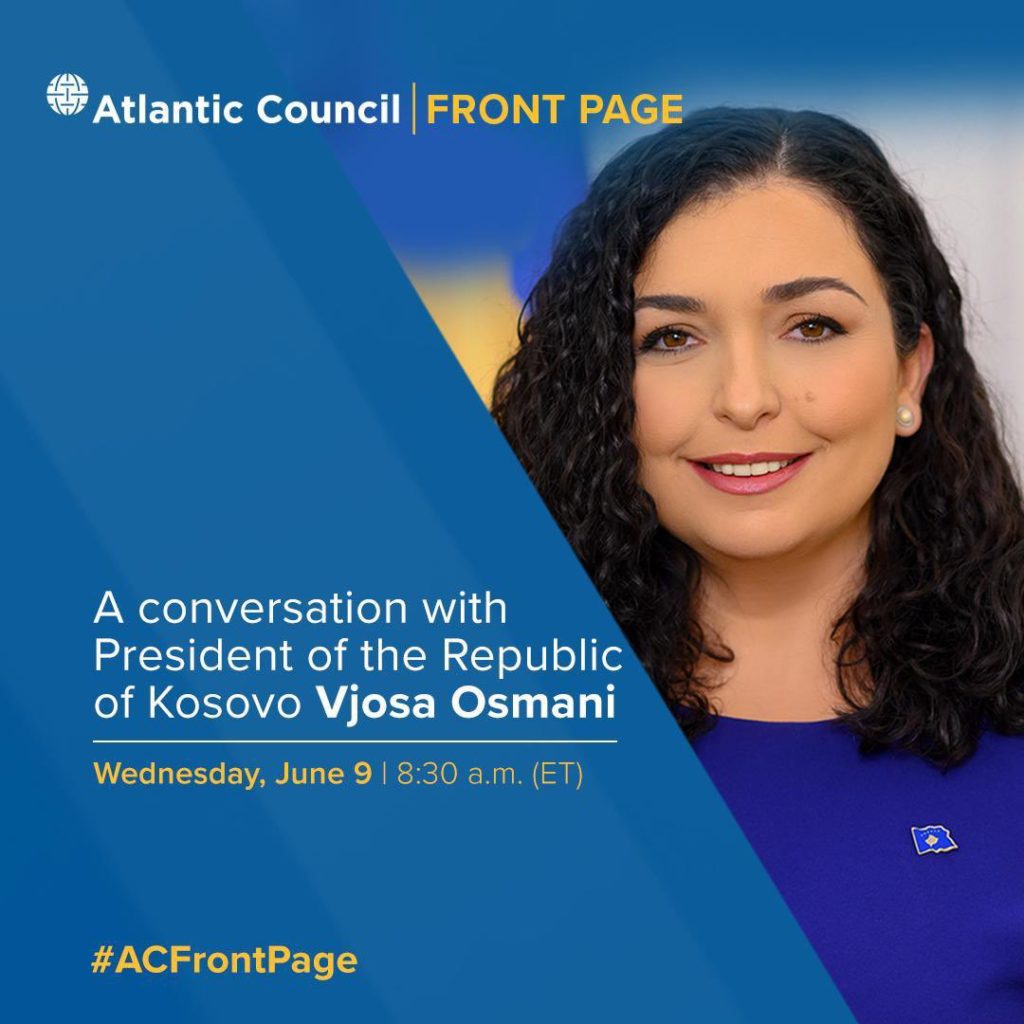
“We have been sitting at the negotiating table even though Serbia has never apologized. We have always been good neighbors,” said Kosovo President Vjosa Osmani as guest of the Atlantic Council.
June 9 – President Osmani discussed Kosovo’s domestic and foreign policy priorities and her agenda for achieving them as a guest of the Atlantic Council Front Page – a new virtual event series featuring top news makers across multiple digital platforms. President Osmani joined the Council for a candid conversation about Kosovo’s priorities and her agenda for achieving them.
What role can the Biden Administration play alongside its EU allies in helping firmly anchor Kosovo in the Euro-Atlantic community? What are Kosovo’s expectations for the upcoming Berlin Process Summit? What is the outlook for the Belgrade-Prishtina Dialogue? And what opportunities does Kosovo see to promote post-pandemic recovery through regional economic cooperation?
Gazeta Express reports that in the virtual conversation, President Osmani addressed the mutual recognition issue and Serbia’s archives of the missing people. “Kosovo is prepared to go to talks to reach a mutual agreement that focuses on mutual recognition between Kosovo and Serbia. I think it will depend on how Serbia behaves in the dialogue, and what it really thinks about its EU membership – as it cooperates militarily and economically with Russia. As President of Kosovo, I think that multi-ethnic values are being implemented in all sectors in the country and I am proud of that. It is time for Serbia to decide what it wants, Kosovo has always shown constructiveness and we have extended the hand of cooperation. We are sitting at the negotiating table even though Serbia has never apologized. “We have always been good neighbors,” said Osmani. With reference to Kosovo’s priorities, Kosovo President pointed out membership to Interpol and NATO membership. “Kosovo’s membership in Interpol is one of the most important priorities to fight organized crime that goes beyond local goes beyond local dimensions,” Osmani said, adding that it is important to work with NATO members to convince them that membership of Kosovo is extremely important for the region.
“To work individually with NATO members to convince them why Kosovo’s membership in NATO is important for the security and stability of the Western Balkans. The KSF, which is our army, is becoming much more professional with the support of NATO and totally with NATO standards. “The KSF has recently participated in the NATO exercise” Defender Europe 21 “, said President Osmani, ends Gazeta Express reporting.
More than a decade after its declaration of independence, the Republic of Kosovo continues to face a set of challenges, both at home and on its path toward integration in the Euro-Atlantic community and its core institutions of the European Union and NATO. While all Kosovars broadly agree on where they want to see their country end up, there remain significant barriers to achieving these goals. While daunting challenges like high youth unemployment, a sluggish economy, corruption, and polarized politics dominate at home, relations with Serbia loom large over almost all foreign policy concerns.
Harnessing the convening power and expertise of the Council’s thirteen programs and centers, #ACFrontPage leverages the Council’s capabilities in social media, press, and digital outreach to spotlight the world’s most prominent leaders and the most compelling ideas across sectors and engage new audiences eager for nonpartisan and constructive solutions to current global challenges. This widely promoted program features the Council’s most important guests and content serving as the highlight of its programming each week.
This discussion is part of the Europe Center’s #BalkansForward Initiative, a coordinated effort to foster a democratic, secure, and prosperous Western Balkans firmly integrated into the Euro-Atlantic community.
Sources: Atlantic Council Front Page, Gazeta Express